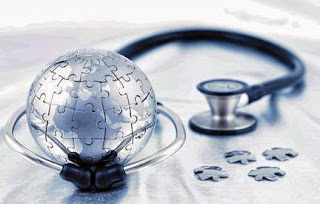The Future of Medical Coding: Trends and Innovations in the Healthcare Industry
Source Link: https://articlescad.com/the-future-of-medical-coding-trends-and-innovations-in-the-healthcare-industry-243101.html
The healthcare industry is constantly evolving, driven by shifts in scientific advancements, patient privacy, and insurance providers' policies. As healthcare technology and services become more complex, coding systems continue to evolve to capture new diagnoses, procedures, and services. The rapid advancement in technology has allowed the development of high-tech medical equipment, cost-effective medicines, and innovative solutions that have transformed the healthcare industry. Medical coding is a vital part of the healthcare industry, converting the information from medical records into standardized codes that can be used for billing, reporting, and analysis. Medical coding ensures that doctors get reimbursed for their work and that insurance companies pay the right amount for patients' care. Medical coding is a challenging and rewarding career that requires constant learning and adaptation.Medical coders face various challenges in their work, such as keeping up with the changes and updates in coding systems, rules, and guidelines, ensuring accuracy and compliance with coding standards and regulations, dealing with complex and ambiguous medical scenarios and documentation, and working under pressure and meeting deadlines. As the healthcare industry continues to expand and innovate, medical coding will also undergo changes and evolve to capture new diagnoses, procedures, and services.
Transition to ICD-11
The International Classification of Diseases (ICD) system is the foundation of medical coding worldwide. The transition from ICD-10 to ICD-11 is underway, and it promises to bring significant improvements in accuracy and granularity. ICD-11 incorporates the latest medical advancements, ensuring that coding accurately reflects current healthcare practices. This transition will require healthcare institutions and coders to adapt to new coding conventions and software systems, but it will ultimately enhance the quality of healthcare data.
AI and Machine Learning
Artificial intelligence (AI) and machine learning are revolutionizing medical coding. These technologies can analyze vast amounts of healthcare documentation and identify relevant codes with remarkable accuracy. Natural language processing (NLP) algorithms, combined with machine learning, enable AI systems to understand and interpret medical records, reducing the burden on human coders and minimizing coding errors. AI-driven coding solutions are also capable of continuously learning and adapting to changes in coding guidelines, ensuring ongoing accuracy.
Remote Medical Coding
The COVID-19 pandemic accelerated the adoption of remote work in various industries, including medical coding services. Remote coding allows qualified coders to work from anywhere, which can help healthcare institutions tap into a broader talent pool and reduce operational costs. However, remote coding also presents challenges in terms of data security and compliance, which need to be carefully addressed to maintain patient confidentiality and regulatory compliance.
Automation and Robotic Process Automation (RPA)
Automation is playing a significant role in streamlining medical coding processes. Robotic Process Automation (RPA) can handle repetitive coding tasks, such as data entry and verification, with high accuracy and efficiency. By automating routine aspects of medical coding, healthcare organizations can free up skilled coders to focus on complex cases that require human expertise, thereby improving overall productivity and reducing administrative overhead.
Blockchain for Medical Coding and Billing
Blockchain technology is gaining traction in healthcare for its potential to enhance data security, interoperability, and transparency. By using blockchain to manage medical coding and billing data, healthcare providers can ensure the integrity of patient records and billing information. Patients can also have more control over their health data, granting access to authorized parties while maintaining privacy.
Telemedicine and Telehealth Coding
The rise of telemedicine and telehealth services has introduced new complexities in medical coding. Coders must accurately document virtual visits, remote monitoring, and telehealth consultations. As these services continue to expand, medical coding will need to adapt to capture the nuances of virtual care accurately. New codes and guidelines are continually being developed to address these challenges.
Data Analytics and Predictive Coding
Healthcare organizations are increasingly using data analytics to improve patient care, outcomes, and cost-effectiveness. Predictive coding algorithms can identify potential coding errors before claims are submitted, reducing denials and reimbursement delays. Moreover, data analytics can help healthcare institutions identify patterns and trends in coding data to optimize resource allocation and improve clinical decision-making.
Interoperability and Standardization
Achieving interoperability and standardization in healthcare data is a long-standing challenge. However, efforts are underway to establish common data standards and exchange protocols, making it easier to share coding data across different healthcare systems and settings. Standardization efforts facilitate more accurate coding and billing processes, reduce errors, and enhance data sharing for research and public health purposes.
Education and Training
With the evolving landscape of medical coding, there is a growing demand for well-trained coders who can navigate complex coding systems and adapt to new technologies. Educational institutions and professional organizations are responding by developing updated curricula and offering training programs that emphasize coding accuracy, compliance, and proficiency in emerging technologies.
Regulatory Changes and Compliance
Keeping up with regulatory changes and compliance requirements is an ongoing challenge for medical coders and healthcare organizations. Staying informed about updates to coding guidelines, billing regulations, and privacy laws is essential to avoid penalties and ensure ethical coding practices.
Conclusion
In conclusion, the future of medical coding outsourcing services in the healthcare industry is characterized by a profound transformation driven by a convergence of significant trends and innovations. The transition from ICD-10 to ICD-11 represents a critical milestone, promising to enhance the precision and granularity of medical coding. The integration of AI and machine learning technologies into the coding process is revolutionizing the way healthcare documentation is processed, offering unparalleled accuracy and efficiency. Furthermore, the adoption of remote coding, facilitated by advancements in telemedicine, allows healthcare institutions to tap into a global talent pool while reducing operational costs. The utilization of blockchain technology is bolstering data security and transparency, providing a robust foundation for managing sensitive coding and billing information. Moreover, automation, data analytics, and interoperability are collectively streamlining administrative processes, making healthcare data more accessible and reliable.
Thriving in this evolving landscape demands adaptability and a commitment to ongoing education and compliance from healthcare organizations and coders alike. Embracing these changes promises to deliver not only greater accuracy and efficiency in medical coding but also heightened transparency. Ultimately, these advancements hold the potential to significantly improve patient care and contribute to the overall effectiveness of the healthcare system, ushering in an era where healthcare data is harnessed to its full potential for the benefit of patients and providers alike.



Comments